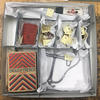Duke Medical Center Archives Blog Category: Ask The Archives

Dirty Work in the Archives: Replacing Gummy Rollers on Our Elmo 16mm Film Projector
Posted On: January 2, 2020 by Rebecca Williams
“Archives—it’s where technology comes to die” is a phrase I frequently use when discussing obsolete audiovisual formats in archives. Think about it, when is the last time you shoved a VHS tape into your VCR, a Betamax into your Betamax player, or a U-Matic into its player? Have you fired up your wire recorder recently? Threaded a film into your 16mm or 8mm projector? How about a DVD? Do you watch those anymore? Listened to any audiocassette tapes or CDs recently? What about a reel-to-reel audio tape? Even if you haven’t, these formats still exist. Often the only copy of a recording is on an obsolete format, which is why archival repositories that collect these obsolete formats, also need to collect obsolete format players. … MORE
Category: News, Ask The Archives

Dirty Work in the Archives: Replacing Gummy Rollers on Our Elmo 16mm Film Projector
Posted On: January 2, 2020 by Rebecca Williams
“Archives—it’s where technology comes to die” is a phrase I frequently use when discussing obsolete audiovisual formats in archives. Think about it, when is the last time you shoved a VHS tape into your VCR, a Betamax into your Betamax player, or a U-Matic into its player? Have you fired up your wire recorder recently? Threaded a film into your 16mm or 8mm projector? How about a DVD? Do you watch those anymore? Listened to any audiocassette tapes or CDs recently? What about a reel-to-reel audio tape? Even if you haven’t, these formats still exist. Often the only copy of a recording is on an obsolete format, which is why archival repositories that collect these obsolete formats, also need to collect obsolete format players. … MORE
Category: News, Ask The Archives

A Brave New Digital World: Archiving Digital Files, Part 2
Posted On: November 19, 2018 by Rebecca Williams
This is the second blog post in a three part series about processing digital files. See the following link for Part 1 and Part 3.
The Duke University Medical Center Archives (DUMCA) recently began processing the files in our digital files backlog, which goes back to 2009. While the backlog was created in 2009, the files date from the mid-1990s to the present. These files are a mixture of born-digital (records created in a digital format) and digitized (records originally created on paper and converted into a digital format). The DUMCA is primarily working on ingesting born-digital records… MORE
Category: Ask The Archives, News

A Brave New Digital World: Archiving Digital Files, Part 2
Posted On: November 19, 2018 by Rebecca Williams
This is the second blog post in a three part series about processing digital files. See the following link for Part 1 and Part 3.
The Duke University Medical Center Archives (DUMCA) recently began processing the files in our digital files backlog, which goes back to 2009. While the backlog was created in 2009, the files date from the mid-1990s to the present. These files are a mixture of born-digital (records created in a digital format) and digitized (records originally created on paper and converted into a digital format). The DUMCA is primarily working on ingesting born-digital records… MORE
Category: Ask The Archives, News

#AskAnArchivistDay, Part 2
Posted On: November 2, 2018 by Rebecca Williams
As Archives Month comes to a close, we bring you the second part of our two part blog series answering questions asked by our two interns. Read part 1 here.
Caroline Waller: "I would like to know more about the history of the [Duke University Medical Center] archives, like when/why/where was it founded.”
The Archives was formally established in 1977 through the efforts of Elon H. Clark, Barnes Woodhall and G.S.T. Cavanagh, with support from the Mary Duke Biddle Foundation; however informal efforts to collect materials documenting the history of Duke Medicine existed well before this time. An October 1965 article published in the Intercom, the… MORE
Category: Ask The Archives

#AskAnArchivistDay
Posted On: October 3, 2018 by Rebecca Williams
Today is #AskAnArchivistDay! While the Duke University Medical Center Archives (DUMCA) doesn’t have a Twitter account, we do have a blog and two very curious archivists-in-training (interns). For this two part blog series, we asked each of our interns for a question.
McKenzie Long: This is super general, but when I first started in archives I wanted to know how we decide what to keep when we're looking at a new accession. Like how do we decide what's historically relevant/in the scope of the archives enough for us to add it to the archives?
It depends.
There are a lot of factors that are part of deciding whether items should be accepted or not at an archives, and, while most of this decision making is done before the materials are… MORE
Category: Ask The Archives

For the Record: Archives and Records Management Services
Posted On: January 14, 2015 by Matthew Shangler
Though we are a relatively small department, our mission is big: to serve the Medical Center community by collecting, preserving, maintaining, and making available for research the permanent records of the DUMC and DUHS. To this end, the Archives offers a broad range of records management services to departments and offices across campus at no cost to our users.
Services we provide:
- Safe and secure storage of permanently valuable records in a climate controlled environment
- Guidance and recommendations on records retention and disposal
- Convenient access to and retrieval of records
- Pick up and circulation of records
Benefits to your… MORE
Category: Ask The Archives
Can I send my department’s accounting records to the Medical Center Archives?
Posted On: August 22, 2012 by Dawne Lucas
Ask the Archivist: Can I send my department’s accounting records to the Medical Center Archives?
The Medical Center Archives only accepts records that should be kept permanently. Whereas some accounting records should be sent to the Medical Center Archives, many should not. You can determine how long you should keep accounting records by referring to Duke University’s GAP 200.240, Retention Period Of Accounting Documents. According to this policy, “Minimum retention requirements for accounting documents are established as part of an effective internal control program to ensure the University can provide the documents requested by any federal, state and local agencies within the Statutes of Limitations. Other… MORE
Category: Ask The Archives
Who can access materials at the Medical Center Archives?
Posted On: June 14, 2012 by Dawne Lucas
Ask the Archivist: Who can access materials at the Medical Center Archives?
Everyone! Students, faculty and staff members, alumni, and the general public all have access to the photographs, papers, oral histories, and memorabilia documenting the history of Duke Medicine. Materials are accessible in the Medical Center Archives reading room, located at 1408-A Christian Avenue, on weekdays from 8:30 a.m. to 4:30 p.m. It is strongly recommended that you contact the Archives at least 24 hours before your visit so that the staff can have materials ready for you when you arrive. The phone number is 919-383-2653, and the email address is dumc.archives@mc.duke.edu. Don’t let the possibility of access restrictions discourage you from… MORE
Category: Ask The Archives
Thanks for dropping off boxes! How do you put them together?
Posted On: May 14, 2012 by Dawne Lucas
Ask the Archivist: Thanks for dropping off boxes! How do you put them together?
The boxes that we use to store departmental records are high-quality, but not easy to put together! Each box should have assembly instructions printed on them. When the box is properly assembled, the instructions will be on the bottom of the box. If you have problems interpreting the instructions, please contact us for assistance. We are more than happy to help you! Here are a couple of box assembly hints: 1) You do not need any additional materials to assemble the boxes. If, after assembling the box, it appears that tape is needed for it to stay together, it is not assembled correctly. 2) There are not any printed assembly instructions for the lids. Fear not; assembling the lids is very… MORE
Category: Ask The Archives
Should I attach an inventory of the materials my department is sending to the Archives?
Posted On: April 14, 2012 by Dawne Lucas
Ask the Archivist: Should I attach an inventory of the materials my department is sending to the Archives?
Absolutely! Since you are working directly with the materials that you are packing, it’s easy to forget that not everyone can easily figure out what they are, and therefore think that there’s no need to prepare an inventory. It’s obviously correspondence from 1990 to 1991, right? Who needs a list? Unfortunately, the materials often aren’t as easy to identify as you might think, and a lack of an inventory can lead to archivists and researchers misinterpreting and misidentifying your files. This problem is easily prevented by preparing a list by individual folder title (or notebook title, etc.) or groups for each box. The list will be used for retrieving records in… MORE
Category: Ask The Archives
My department has records to send to the Medical Center Archives. How should we pack them?
Posted On: March 14, 2012 by Dawne Lucas
Ask the Archivist: My department has records to send to the Medical Center Archives. How should we pack them?
The Medical Center Archives purchases acid-free boxes to store departmental records. Please contact the Medical Center Archives (383-2653 or email us) to request boxes. It usually takes two of these boxes to pack one full file drawer. You should fill the boxes to the point that the folders do not slouch, but can still be removed easily. Hanging folders do not fit well in the boxes and should be avoided. The Archives kindly asks that you return any unused boxes. A few tips for box and lid assembly: Follow the instructions printed on the box. You do not need any additional materials (including tape) to assemble the boxes. When assembling the lids, look for the… MORE
Category: Ask The Archives
What does “Archive” mean?
Posted On: February 14, 2012 by Dawne Lucas
Ask the Archivist: What does “Archive” mean?
Don’t worry; I won’t start quoting definitions from The Merriam-Webster Dictionary. I do want to make you aware, however, of what archivists mean when they say the word “archive.” In today’s world of Gmail and online “Archive” buttons, it’s understandable to think that “archive” means “to save something for later, even if it’s just a short amount of time.” My job is “to identify, preserve and make available noncurrent records and papers of enduring value.”1 Noncurrent refers to records that you do not plan to access on a regular basis. A good rule of thumb is that the records should be at least three years old, although there are exceptions to this rule. It’s possible that you will need to refer to some files after you have… MORE
Category: Ask The Archives
